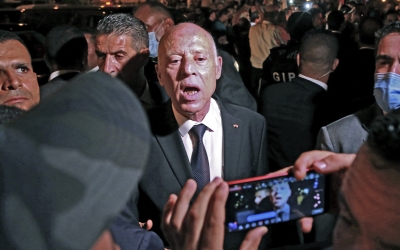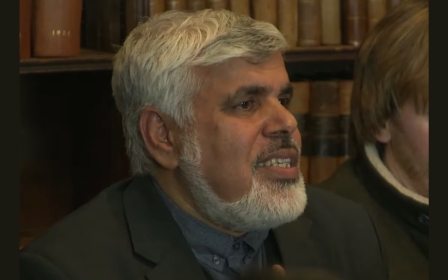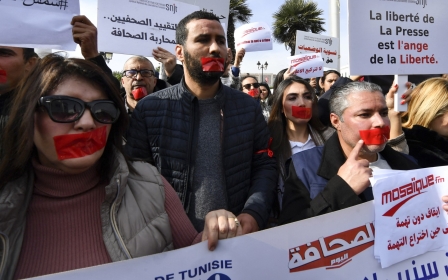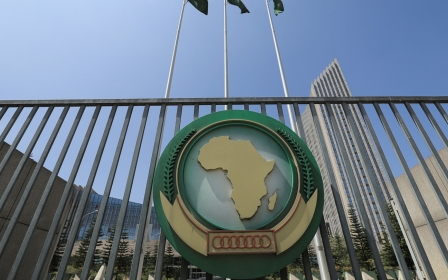Hate speech against Black Africans in Tunisia spreads on social media

Social media is being used to spread hate speech and conspiracy theories about African migrants in Tunisia, days after President Kais Saied delivered a speech widely condemned as racist and conspiratorial.
Middle East Eye found examples of anti-immigrant and anti-black sentiments being spread in Tunisia across Facebook, Twitter and TikTok.
On Facebook, the popular page Tunisian Reality shared a number of videos interviewing people on their views about migrants from other countries in Africa.
Several of the interviewees share their dislike of such migrants, calling them "aggressive" or engaging in discriminatory mimicking gestures.
Another Facebook post celebrated violence against an African migrant who had been attacked by locals in purported retaliation for "assaulting a child".
New MEE newsletter: Jerusalem Dispatch
Sign up to get the latest insights and analysis on Israel-Palestine, alongside Turkey Unpacked and other MEE newsletters
Many users on the platform moved to private Facebook groups to share conspiratorial and discriminatory content, including one group titled "Tunisian against the presence of sub-Saharan African migrants in Tunisia".
One conspiratorial post on a Facebook group named "Together for the liberation of Tunisia from Africans" theorised about a grand plan to "to erase our existence from our land that is irrigated by the blood of our martyrs" through migration.
MEE has reached out to Facebook and Twitter for comment but did not receive a response by time of publication. TikTok told MEE it would investigate the videos.
Last week, Saied published a statement following a national security meeting, stating: "There has been a criminal plan since the beginning of the century to change the demographic structure of Tunisia, and there are parties that received large sums of money after 2011 for the settlement of illegal immigrants from sub-Saharan Africa.
"The undeclared goal of the successive waves of illegal immigration is to consider Tunisia a purely African country that has no affiliation to the Arab and Islamic nations."
Some 300 West African migrants were set to leave Tunisia on repatriation flights Saturday, fearful of a wave of violence since Saied's tirade.
Several commentators likened Saied's comment to the notion of "the great replacement", a conspiracy theory that white people in Europe are being usurped by foreigners, mainly from Africa and the Middle East.
The speech was even endorsed publicly by Eric Zemmour, a far-right French political figure who launched a presidential bid last year built around that conspiracy theory.
In recent months, the little-known Tunisian Nationalist Party has used social media to spread a baseless conspiracy theory that outside forces were colluding to alter the demographics of Tunisia.
'Hotbeds for racial hate'
On Twitter, several users shared an image of a woman holding up a sign that read "No settlement, no resettlement, Tunisia for Tunisians".
Users shared conspiracy theories and videos alleging that African migrants in Tunisia were killing stray cats and dogs so that they could eat them.
"Please save our cats from these monsters! Tunisia cannot become Chicago," said one vocal anti-migrant Twitter account.
The same account later tweeted about an alleged robbery incident in the US: "Black Violence in NYC - we cannot allow Tunisia to become infested with BLM [Black Lives Matter] thugs. This is what they do best. Kais Saied deport all the illegal black invaders ASAP".
An account called "Tunisian Cat" that describes itself as an "anti-sub Saharan agent" was set up on Youtube, TikTok and Twitter in late February.
The account labelled migrants as "invaders" and called their countries of origin "Wakandas", in reference to the fictional African country in the Marvel film Black Panther.
The hate speech was condemned by analysts on social media.
"Facebook & TikTok in Tunisia are... becoming hotbeds for racial hate," said academic Monica Marks.
"Revolting posts alleging Black ppl to be cat-eating savages & rapist gangs are circulating w/ seemingly no content moderation in [a] context where [the] president pushes fascistic language & Great Replacement theory."
Doxing
Separate to the issue of racialised hate speech, activists also alleged that Facebook was being used to dox government opponents.
"A Tunisian social media influencer Thamer Badida has been sharing confidential information and home addresses of political adversaries," tweeted data analyst Makrem Dhifalli.
Dhifalli said that Badida had shared the personal details of activist Habib Bouajila before removing the post.
A report in June last year by digital rights group Access Now found that online doxing, or giving out private identifying information of others, was used to smear female judges in Tunisia amid Saied's seizure of all branches of government, including the judiciary.
Tunisia has been engulfed in political and economic crises since July 2021, when Saied unilaterally suspended parliament and dissolved the government in what many have called a "constitutional coup".
He subsequently ruled by decree, before pushing through a new constitution that enshrined his one-man rule.
Middle East Eye delivers independent and unrivalled coverage and analysis of the Middle East, North Africa and beyond. To learn more about republishing this content and the associated fees, please fill out this form. More about MEE can be found here.





